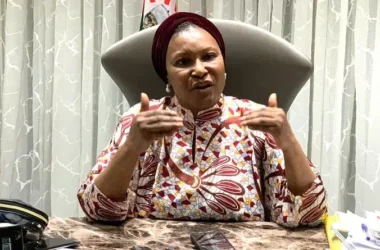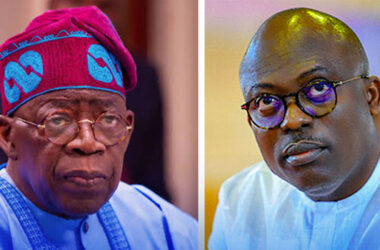The ongoing power struggle between Senators Aliyu Magatakarda Wamakko and Ibrahim Lamido has escalated in Sokoto State, leading to a significant split among the traditional rulers. This rivalry is rooted in the control of the ruling All Progressives Congress (APC) in Sokoto, with Wamakko positioned as the party’s established leader and mentor to the current governor. In contrast, Lamido is actively working to diminish Wamakko’s influence and claim leadership for himself.
As this feud intensifies, DAILYTRUST reports that it has begun to fracture the once-unified support of Sokoto’s traditional rulers. Observers note that many traditional figures are aligning with either Wamakko or Lamido, leading to a deepening divide within the APC. Lamido’s faction has even threatened to create a new party leadership structure to “rescue the APC” from what they perceive as Wamakko’s overreach.
Hon. Sani Yakubu Gudu, a spokesperson for Lamido’s faction, claims that they are experiencing a significant groundswell of support from traditional rulers, former commissioners, House of Representatives members, and local academics. He stated, “The groundswell of support we’re experiencing reflects how many people want new leadership.”
The shift in allegiances became particularly apparent when 19 traditional leaders, including district and ward heads from Sabon Birni Local Government Area, resigned their official positions to pledge loyalty to Lamido.
Among these resignations was the District Head of Sabon Birni, Alhaji Abdullahi Muhammad Bawa, who had held his position since 2014. Bawa announced his support for Lamido on October 16, expressing dissatisfaction with the current administration. He said, “My allegiance now lies with Lamido, who I believe is committed to the genuine welfare of our people.”
Several other traditional leaders echoed this sentiment. Alhaji Lauwali Shuaibu, the ward head of Taka-Tsaba, emphasized that Lamido’s consistent support during crises, such as bandit attacks and natural disasters, has won him the respect of many in the community. “Lamido has shown consistent support in times of crisis, which has won him our respect and allegiance,” Shuaibu stated. He highlighted that this support has prompted many traditional rulers to resign their titles in favor of aligning with Lamido politically, noting, “Our villages have been ignored for too long. With Lamido, we see someone who actually listens to us.”
In a similar vein, Alhaji Jamilu Gwanda Gobir, who resigned as Ubandoma of the Sarkin Gobir, revealed that he was not alone in stepping down; ten other traditional leaders joined him. He explained that their actions are intended to support Lamido in the upcoming elections, stating, “This is our way of repaying him for his commitment to our communities.” Gobir lamented the historical neglect of their district, claiming, “The neglect of our district is finally being recognized by someone willing to address it.”
The political landscape in Sokoto was further complicated by the murder of Alhaji Isa Muhammad Bawa, the former Sarkin Gobir of Sabon Birni, who was killed while held captive by bandits. This tragic event has exacerbated existing tensions and strained relations within the APC’s Wamakko-led faction. Analysts believe this discontent could significantly influence voting patterns in the forthcoming general elections, particularly in Sabon Birni, where residents may withhold their support for Wamakko.
Before his death, Bawa was transferred from Sabon Birni to Gatawa district, a decision seen by many as punitive due to his political activities during the last election. Following his murder, Sokoto’s current governor, Alhaji Ahmed Aliyu, reshuffled traditional roles across the state, a move interpreted by local observers as politically motivated retaliation.
Political analysts have raised concerns about the implications of traditional rulers becoming embroiled in the Wamakko-Lamido rivalry. Professor Bello Bada of Usmanu Danfodiyo University warned that this trend could lead to broader regional instability. He cautioned, “This trend threatens the North’s stability and democracy in general,” emphasizing the need for political leaders to prioritize pressing issues like security and economic hardship over political infighting.
Barrister Sidi Bello provided additional insight into the historical context of the rift, noting that Sabon Birni, part of the ancient Gobir kingdom, has long struggled for recognition and status within the Sokoto political landscape. Despite other areas in Kebbi and Zamfara gaining elevated emirate status, Sabon Birni has been left feeling marginalized. This longstanding resentment has fueled local support for Lamido, as many view him as a champion for their aspirations.
Bello pointed out that since Nigeria’s return to democracy in 1999, political power in Sokoto has traditionally shifted among three main districts. With each district typically holding the governorship for two consecutive terms, many in Sabon Birni feel it is their turn to lead. This feeling of exclusion has heightened tensions and created an environment ripe for political maneuvering. “Sokoto East has waited long enough. The people feel it is time for them to govern, and Lamido has made it clear he’s willing to champion that cause,” Bello said.
In response to these developments, the APC’s Sokoto State chairman, Alhaji Isa Sadiq Achida, has attempted to downplay Lamido’s influence, labeling him as a minor threat due to his lack of success in previous elections. He remarked, “He couldn’t secure his own ward, let alone make a substantial impact statewide,” insisting that the party still enjoys significant support in Sabon Birni.
Achida claimed that the recent resignations among traditional leaders stemmed from personal issues rather than a collective political shift towards Lamido. He noted, “Marafa Gobir, who recently resigned, faced an investigation by the government, which likely influenced his decision. There is no mass exodus among traditional rulers with official portfolios.” While he acknowledged that some lower-ranking traditional leaders might have changed their allegiances, he maintained that the APC’s record of governance would ultimately ensure their electoral success.










